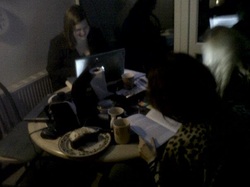So this week we had two guest speakers, Simon Winder from Penguin and Simon Littlewood from Random House, and I attended another OPuS event, this time on mergers and acquisitions. So I heard from Penguin and Random House and mergers, you'd think that would give me a lot to write about.
But no, because this week we were also introduced to Chatham House rules which say:
When a meeting, or part thereof, is held under the Chatham House Rule, participants are free to use the information received, but neither the identity nor the affiliation of the speaker(s), nor that of any other participant, may be revealed.
Basically we were asked not to publish anything anyone said. So I can't.
But I can sum up that the talks were really useful and that it was really interesting to hear from representatives of some of the big name houses on some of the big topics like the role of digital, the role of agents and the phenomenon of 50 Shades of Gray. I also learnt a lot about the businessy side of things from the mergers and acquisitions talk, things that I thought would be boring but that a few anecdotes made very easy to understand and genuinely interesting.
So yeah not the most detailed of blog posts but it's the best I could do. Perhaps it's best to sum it up with - you had to be there.

So this is the scene at my house today. We are all crammed round the table working hard on all the projects we have due in the next couple of weeks.
I think this specific moment was us working on marketing plans for hypothetical books.
We have been getting through the work pretty well but there have been a lot of Facebook breaks and yes that is half a cake, the other cake fueled the work.
So we are 20 cups of tea/coffee in and hopefully after another 20 we will all be finished.

So this picture pretty much summed up my day. I had one long task which I just got on with, but more on that later.
The day began with me sitting about waiting for people to get back from a meeting so they could tell me what to do. But I didn't just sit there on Twitter (for the whole time at least), I worked through the new submissions to the Journal of Small Animal Practice to earn my keep. This was the correct answer.
When people did get back I was told to carry on with a task I began last week which was to collate the answers given in an online survey on Open Access in nursing journals the department had run. I basically had to work my way through 800 odd answers, making a list of what everyone had said.
It wasn't the most exiting thing I've ever done. Once I had finished the question asking people to name the individual journals they have used I moved onto what I thought would be the much more straight forward question of where do you live. I was wrong. Considering the people answering this questionnaire are all
Another day, another guest speaker. This time it was Meredith Walsh from Penguin Group UK's production department to talk to us about green print production.
I'll be honest, I hear green I expect self-righteous preachy environmentalist so I wasn't sure about this talk. But again I was pleasantly surprised. Meredith was really down to earth and managed to balance business and environmental issues in her talk. Her attitude seemed very much - this is how it is, fact. And you could see why.
In her role at Penguin, these environmental issues have just become another aspect that needs to be taken into account alongside timing and budget. The publishing sector is so reliant on the paper industry, which has been so affected
So this Tuesday there were two guest speakers at uni to give us an insight into their two very different publishing careers in travel publishing and as an author. While initially I wasn't particularly enthusiastic about either of these topics, I am very glad I went.
First there was Stephen Mesquita who came to talk to us about travel publishing. He took us through the history of travel publishing, how it evolved from the Victorian era to the world of Tripadvisor and Google Maps that we know today. It was interesting to see how, more than a lot of other books, travel guides really rely on visibility to attract their audience. Branding and design play a big part in sales decisions and so a presence in physical book shops is important. And it's because of this and the rise of free online content and user-generated review sites that travel publishing has been experiencing a steady decline in the last ten years.
But despite the doom and gloom attitudes surrounding the travel publishing industry at the minute, I found the talk really interesting because it was showed
So i bang on about open access a lot on here and I realise that people may not be interested.... so I'm going to include a video in this post to make it more exciting.
This video was made as part of Open Access Week and explains the principles of open access, that journal content is free to access by anyone not just those who subscribe to the journal, but more importantly, I think, it demonstrates the climate that has made a shift to open access so necessary.
The people narrating the video are clearly scientists who have become frustrated at how hard it has become for them, and others like them, to access scientific material even though it is available online. You can really feel the anger and frustration coming through the cartoons and it is this frustration that led to the Elsevier boycott, the Finch report and the new edicts by research councils that require publishers to offer open access on any research council funded articles/journals by April 2013.
But these guys don't just represent the scientists, they also draw attention to often forgotten issues such as the fact that journal articles are particularly hard to access in developing countries and in some ways this is impeding their educational and academic development.
While informative, this video is still very bias and doesn't go in depth into the reality and sustainability of open access, especially for those in arts and humanities but it is a good introduction into why open access is such a hot topic in journals publishing at the moment. So enjoy!
Even though my supervisor is still away sunning herself, she has left me a lot to be getting on with.
Today I was scouting out submissions for the perspectives (opinion articles) section of one of Wiley's medical journals. This involved familiarising myself with the format and then searching through letters to the editor to see if there was anything that might make a good full-length article. I was completely lost content-wise but I feel I got the hang of the task and could see why this kind of research is important for finding new content, but perhaps more importantly new contributors.
From here I moved on the collating the results of an online survey about open access nursing journals. I chose to sort out the answers to one of the most open ended questions on the survey - which open access journals have you accessed? Answers ranged from the somewhat over-helpful lists of many


 RSS Feed
RSS Feed